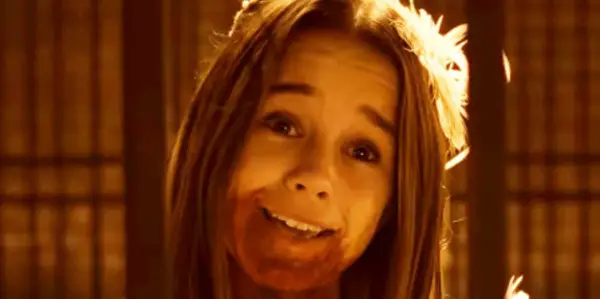Warning: Spoilers Ahead!
It is rare to see a horror film like Abigail (2024) that combines such a genius premise and execution with such overly-revealing marketing. The story followed a small band of criminals (Melissa Barrera, Dan Stevens, Kevin Durand, Kathryn Newton, William Catlett, Angus Cloud) who kidnap the titular ballerina (Alisha Weir) and take her to a secluded mansion, where they will hold her for ransom. However, these perps do not know who they’re dealing with. Sounds tantalizing vague, right? But Universal’s marketing kind of screwed the pooch. I’m going to explore where specifically the advertising fumbled, and why.
The Trailer Gave Away The Twist
A good trailer should always give one just enough information to be intrigued, but never so much that they feel like they’ve just gotten the whole story in two and a half minutes. The same is especially true for movies with a big, terrifying twist. However, whoever cut the trailer for Abigail didn’t get that memo. Throughout the trailer (which should’ve been a teaser, come to think of it), we see not only that Abigail is actually a vampire, but we continuously see snippets of her various attack sequences from throughout the rest of the movie.

Now you might think, what’s wrong with that? To which I answer, that Abigail being a vampire is only revealed at least a half hour into the movie (my exact memory is a little hazy, since I saw it a couple months ago). This is meant as a big scary surprise, because it is kept extremely vague as to what awaits our characters, and why they’ve been brought together for this criminal scheme. While there were still some plenty intriguing turns throughout, playing the vampire card took some of the fun out of it for viewers.
Audience Response
While audiences overall still enjoyed the picture, with an 85% score on Rotten Tomatoes, many also noted to not watch the trailer. One IMDb user who assigned Abigail a 7/10 said that “I believe the film is best watched without prior exposure to the trailer, hard as that is these days” (IMDb.com). Another user, scoring it a 6/10 headlined their review with “I wish the promotional material didn’t give away that Abigail is *the* vampire” (IMDb.com). Still another complained that “It is rare for a horror movie to give away its twist in its trailer” (IMDb.com).
What to Learn From This
I think the obvious overarching lesson here is simple: Don’t give away the unique twist in your premise! Now this is a risk, but that’s a risk movies must be willing to take if the hypothetical success of their movie relies on what separates it from the pack. An apt comparison, to my mind, would be the trailer for the home-invasion thriller You’re Next (2013). The main factor that helped differentiate this one from others of its type was its lead heroine Erin (Sharni Vinson).
She was not only the Final Girl, but actively became more of a threat to her own assailants as the story progressed. But smartly, this wasn’t even hinted. Instead, viewers got the base setup of a family gathering for dinner in a remote home, that comes under siege by masked killers. Subsequent to the movie’s release in August 2013, critics and horror fans alike praised Vinson’s badass performance as the highlight, a level of surprise and enjoyment that likely would’ve been diluted had the trailer revealed this table-turning dynamic between protagonist and antagonists.
Closing Thoughts
The bottom is simply this: Studios, don’t give away the ball as to what sets your movie apart from the herd. Take the cue of a movie like You’re Next, or Hereditary (2018) and Midsommar (2019), which would also be comparable in this regard. In addition, trust the skill and talent of your advertising staff, as well as the target audience, enough to hold back on your big revelation(s), and have faith that if you build it, they will come. More importantly, have faith that word will spread and your movie will still succeed. Otherwise, you risk tainting that audience experience, even if only a tiny bit.
Does content like this matter to you?
Become a Member and support film journalism. Unlock access to all of Film Inquiry`s great articles. Join a community of like-minded readers who are passionate about cinema - get access to our private members Network, give back to independent filmmakers, and more.